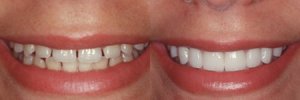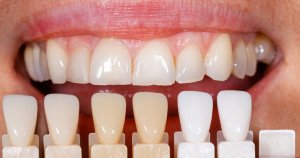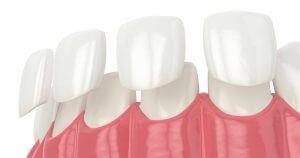Can you whiten veneers? Maybe you’re getting veneers soon, you just got them, or you’ve had them for a while. Whatever your case may be, Dentaly.org wants to make sure you have all the facts before you try to whiten veneers.
In this article, we’ll answer some common questions, including:
- What are veneers?
- Can veneers stain?
- Can veneers be whitened?
- Is it safe to use teeth whitening agents for porcelain teeth whitening?
- What are ways I can whiten veneers?
- How can I avoid staining veneers?
- What are some tips for cleaning veneers?
By answering these questions, we hope to give you clarity on teeth whitening for crowns and veneers.
What are veneers?
If you want to improve your smile, dental veneers are a simple option. Veneers are thin coverings that are placed over the front (visible) part of the tooth. They look like natural teeth. Veneers can be used to correct a wide range of dental issues, such as:
- Teeth that are stained and can’t be whitened by bleaching
- Chipped or worn teeth
- Crooked or misshapen teeth
- Uneven spaces or a large gap between the upper front teeth
Veneers are made of either porcelain or composite resin material.
Porcelain veneers
Porcelain veneers are thin layers of porcelain placed over the enamel of each tooth to give you an even, bright smile.
Composite veneers
A composite resin veneer is made from a tooth-colored filling material bonded to the tooth.
Can veneers stain?
Yes. Composite veneers stain easily due to the resin material used to make them. On the other hand, with veneers made of porcelain, it’s a slightly different story.


Do porcelain veneers stain?
Porcelain veneers are stain-resistant and extremely durable. They have a nice glaze on the top of them but if that glaze wears off then the veneers can get stained.
Can veneers be whitened?
Porcelain veneers, yes. Composite resin veneers, no. Even though you can’t whiten composite resin veneers, that doesn’t mean you can’t improve the way they look. Professional dental cleanings can help remove surface stains. If your veneers are significantly discolored, your dentist may recommend replacing them.
Is it safe to use teeth whitening agents for porcelain teeth whitening?
Yes. No need to worry that whitening will harm your crowns or porcelain veneers. They are made of extremely strong materials and won’t be affected by the bleach in the tooth whitening treatments.
5 ways to whiten porcelain veneers:
How to whiten porcelain veneers through several options:


1. Brush your teeth after eating staining foods
Fortunately, veneers don’t stain as easily as regular teeth, so you won’t have to monitor them as often. However, if you’re a coffee lover, brush your teeth after your morning or mid-afternoon cup to keep your veneers from getting stained.
Avoid acidic food and drink like lemon, soda, and coffee. Since they are acidic and sugary, this will cause more noticeable stains, break down the porcelain, and increase the likelihood of gum disease.
2. Use polishing toothpaste
There are toothpaste brands that are specifically designed to remove buildup on veneers and minor stains. While some are available online, your dentist may recommend prescription-strength fluoride to keep your veneers at their whitest.
3. Get them professionally cleaned
The same way plaque builds up in regular teeth due to food particles and decaying sugar, it also damages the surface of veneers and makes them look dull. Schedule cleanings twice a year to ensure their longevity and that they remain as white as possible.
4. Tooth-whitening kits
Tooth-whitening kits work on your natural teeth and veneers!
Always follow the instructions completely when it comes to a tooth-whitening system and talk to your dentist before attempting to whiten your teeth at home.
5. Cosmetic dentistry
At about the six or seven-year mark, you’ll have to replace your veneers to have them look as bright as when you originally got them.


How to avoid staining veneers
1. Maintain good brushing habits
Veneers need to be brushed just like natural teeth. Brushing with flossing helps to remove surface stains and keep the underlying tooth healthy.
Veneers only cover the front of your tooth, leaving the sides and back of the tooth exposed. Brushing and flossing your teeth twice a day is the easiest way to prevent exposed areas from decaying.
2. Use a gentle toothpaste
Many whitening kinds of toothpaste contain baking soda, which is safe for natural teeth but too abrasive for veneers.
Look for gentle toothpastes or products designed for use on veneers. Your dentist can make product recommendations if you’re not sure what’s best for you.
3. Don’t smoke
Tobacco doesn’t cause veneers to stain, but smoking can lead to significant yellowing of the underlying tooth. This can then lead to patchy discoloration of your smile. Tobacco may also affect the integrity of the bonds holding your veneers in place, so you may need to get them replaced sooner than a non-smoker would.
According to guidance from the Centers for Disease Control, quitting tobacco can also give you fresher breath, healthier gums, and help you avoid future dental problems down the road.
4. Go to your dentist regularly
Just as you brush and floss daily, you should see your dentist regularly as part of a healthy smile routine. Getting examinations and cleanings can help prevent cavities and treat decay and gum disease in its early stages.
Maintaining healthy teeth with the help of your dentist will maximize the longevity of your veneers and keep your smile looking beautiful.
Tips for how to clean veneers
1. Switch to a soft bristle toothbrush
You may think a hard bristle toothbrush is the best way to clean your teeth and gums, but many hard bristle brushes are too rough. They may even cause the gums to recede over time, which can expose your natural teeth to decay and cause discoloration.
Stick with a soft bristle toothbrush instead. Soft bristles get your teeth clean without the risk of wearing down your veneers and gums.
2. Avoid toothpaste with baking soda
Whitening veneers with baking soda is a no-go! While baking soda is a great ingredient to clean natural teeth, it’s abrasive for porcelain veneers, causing them to wear down earlier and become discolored.
Conclusion
Now that you know the answer to your pressing question, “can you whiten veneers?” and you’ve learned how to whiten crowns and veneers safely, try out some of the tips above about tooth whitening for veneers and how to prevent staining.
If you are still uncertain about attempting tooth whitening veneers on your own, consult with your doctor to come up with a plan of action for you!
Check out teeth whitening for other kinds of fake teeth.
Daxon Dentistry: How to whiten porcelain veneers. Consulted 19th November 2021.
American Dental Association: Veneers. Consulted 19th November 2021.
Towncare Dental: A warning about whitening with veneers and crowns. Consulted 19th November 2021.
CDC: Benefits of quitting. Consulted 19th November 2021.




